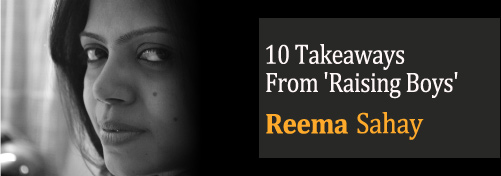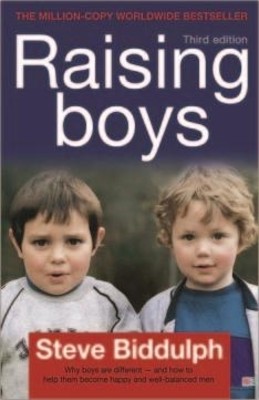10 Takeaways From ‘Raising Boys’
Taking the discussion forward from my last post on this wonderful Parenting book called ‘Peaceful Parent, Happy Kids’ by Laura Markham; in this post, I would like to offer glimpses of another recommended read called ‘Raising Boys: Why Boys Are Different – and How to Help Them Become Happy and Well-Balanced Men’ by Steve Biddulph.
I chanced upon this article several months ago, which eventually led me to look up resources for ‘raising boys’. Well, I completely look down on gender stereotyping [incidentally, that was the subject of my first post here] but it is also true that boys and girls are wired differently [ok, so it is debatable but, I would lean a little on this assumption because of general observation about girls and boys], and when we attempt to understand those differences, we help our children thrive better. You know, as women when we are raising girls, atleast we have our own experiences to fall back on; but when we are raising boys, many times we find ourselves in a quagmire.
Here are 10 Takeaways from this insightful read:
- The most important point of this book is understanding the 3 stages of boyhood.
- Birth to 6 years [the Gentle Years]: Mother plays the key role by offering love, protection and nurturing. It provides a solid anchor to his emotional life.
- 6 to 13 years [Learning to be Male]: Father plays a key role since, he is the first male role model for his son. This is a critical time when fathers must spend more time in understanding their sons by spending time, playing with him, talking about life, about his own childhood and building connection.
- 14 and onward [Becoming a Man]: Teenage is a restless and confusing time when your sons would need adults other than parents who can act like mentors.
- Boys need order, structure, and rules. They need boundaries of behavior. Boys are more concerned about competitiveness. They have inherent need for a lot of activities and physical space.
- Baby boys’ brain develop, more slowly than in baby girls. Moreover, boys tend to use only one side of the brain, while girls use both sides. So, boys will have trouble doing things which involves skills like reading, talking about feelings, and solving problems through quiet introspection rather than by beating people! So, what you need to do? Talk, talk, talk. From early age, on every opportunity. Start reading to them early and tell them stories. Explain emotions.
- Boys often take more time to be ready for school, and therefore we also find girls doing better in early school years. Avoid putting your sons in school very early. They will shine when the age is right.
- Fathers play a very important role in a son’s life – from teaching them to respect women to being unafraid of one’s own emotions and expressing them or teaching self-control through play.
- Involve your sons in helping around the house from a very young age. It prepares them for independent living and being useful improves their self-esteem. Not knowing your act around the house isn’t going to be funny for their life partners, and it certainly stopped being a virtue sometime back.
- After a certain age [before teens], give positive messages about sex. Resist and discourage sexualizing boy-girl relationship before 15 years. [I personally hate it when people call little boys and girls as girlfriend-boyfriend in jest].
- Help your boys in overcoming their natural tendency towards arrogance. Especially in India, where inside a household as well as outside, boys get the message that they are superior to girls, it leads to arrogance. They can be engaged in the service of others from young age like taking care of elderly, young children, helping others, etc.
- Bullying is a big problem among boys and must be taken seriously by parents as well as the teachers.
- Encourage sports in boys but it must be participatory and fun for everyone. Boys can get a lot from sports – fun, fitness, character building, friendship and a sense of achievement.
Remember, like all books [and more so parenting books]; read with an open mind. They are enlightening in certain ways and yet limiting in certain other ways. If you take them as guides, they are wonderful. You have to use your common sense and draw the line.
I am always keen to know about more interesting books. Have any parenting book to recommend?
Reema Sahay is a Stay-At-Home-Mom, Freelance Writer, Voracious Reader, Passionate Blogger, Social Media Enthusiast, Internet Junkie and Ex-Marketing Communication Professional. She spends her days running after her very curious toddler, ‘the star’, and catching up on books when he naps. She writes about charms and challenges of life at Pen Paper and shares her passion for books at Recommend Books. She sometimes feels that her 5.5 years stint in Marketing Communication was in another life




